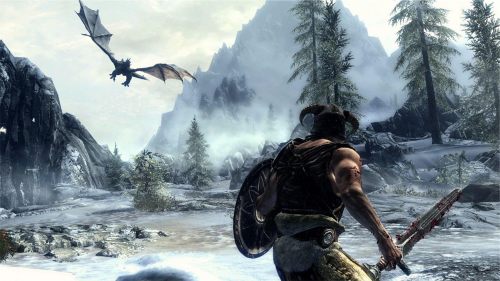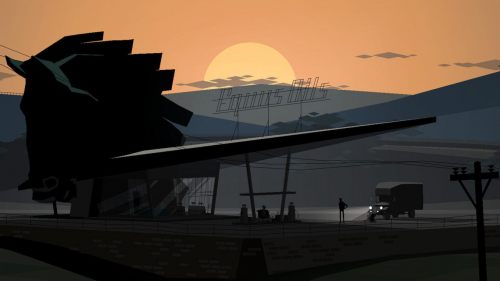Game Review: METAL GEAR SOLID V Weirds The Pain Away
Metal Gear Solid is a franchise that I somehow made it to 2015 without having touched. I’ve been aware of it - it’s such a storied series that it’s impossible not to be. I knew its reputation for bizarre storylines, lengthy cutscenes, and sometimes silly stealth. But for whatever reason, I’d never played an MGS game until this year. With that in mind, I leapt into Metal Gear Solid V: The Phantom Pain intentionally lacking any knowledge of the series’ intricate lore.
As you might expect, the experience was bewildering. Hideo Kojima’s script and direction tend towards a similar brand of storytelling to Dark Souls or latter-day Halo games, offering next to no context or backstory. If you don’t know what’s going on, you won’t know what’s going on. Even the subtitle, The Phantom Pain, is extremely specific without giving you any idea what the game will be like. It certainly doesn’t prepare you for a game that throws giant flaming monsters, flying ghost children, and incongruous ‘80s pop tunes at you within about five minutes of starting (the zombies, plant people, and robots come later).
Thus, it’s amusing that MGSV opens with a disclaimer stating that it is a work of fiction. The opening sequence is lengthy, hilarious, and bugnuts, featuring Big Boss (or is he Snake? Tortured Snake? I have no idea, and I don’t care) waking from a coma missing an arm and bearing shrapnel throughout his body. Playing through an action sequence as a muscle-atrophied hospital patient is giggle- and panic-inducing in equal measure, and miscellaneous oddities like the cutscene cameraman having his own grunting and breathing sound effects set the stage for a strange game to come.
The strangest thing about The Phantom Pain is undoubtedly how serious it all is, given its content. The story is an odd mixture of totally out-there bizarro genre craziness, dudebro grit, and - perplexingly - earnest political commentary, and it’s unclear which is the “true” face of the game. I personally suspect Kojima is 100% aware of how silly military gaming is, and is intentionally rubbing our faces in it by a) mixing it with outright comedic material, and b) subtly and unsubtly drawing attention to the moral issues behind it. Or maybe it’s all an accident. It’s hard to tell in a game that features a caption that reads “Guest Starring: Child Soldiers.”
MGSV’s story takes its mercenary protagonist Big Boss from the dusty cliffs and plains of 1980s Afghanistan to the equally desolate oil-soaked plains of Central Africa. Both are surprisingly empty of landmarks or incident for an open-world game made in 2015, and while some players might find that boring, I liked it. There’s a refreshing loneliness to the back-and-forth this game forces you to do. It’s calming, in a way - or, when there’s a time limit involved, nerve-jangling.
Missions themselves (each one self-indulgently bearing opening and closing credits) are also open, featuring multiple objectives which only reveal themselves as you discover them, or after the mission is complete. There’s a lot of emphasis on replaying missions, particularly in the game’s protracted and irritating second half, where you’re forced to replay earlier missions on hard mode in order to progress. But repeated content aside, the mission design is terrific, and heavy on improvisation. Going in guns blazing is an equally valid tactic to ghosting a level, and when you mess up, the game simply forces you to deal with your mistakes, rather than dumping you in a fail state. And most importantly, the emergent, systems-driven stealth in Metal Gear Solid V is among the best I’ve ever played.
Afghanistan, it turns out, is a sandbox in more ways than one. (The game’s eventual shift to Africa ruins this line, but fuck you, I’m using it anyway.) Big Boss is equipped with - especially as the game progresses - a vast array of gadgets and abilities. The standard scouting, cover, stance, and silent takedown systems are all present and correct, of course, but it’s the unique elements that really make this game stand out. Weather and time of day, for example, can be powerful allies, with ambient light level and random storms affecting how visible or audible Big Boss is. When you’re sighted, the optional Reflex Mode gives you a moment of slow-motion to deal with the situation, which is both heart-pumping and empowering. AI is smart and adaptive, forcing you to change your strategies from mission to mission or even moment to moment. There’s little like the thrill of getting in and out without being seen, except maybe the thrill of getting in and out with a lot of trouble along the way. Even the boss fights - though some are annoying bullet sponges - can be dealt with in a variety of ways.
But the main missions are only a drop in the ocean that is Metal Gear Solid V. A significant part of the game involves building up the floating military platform known as Mother Base, which is far more fun in practice than it sounds on paper. The weapon and ability upgrades that unlock within Mother Base feel meaningful, with very little in the way of incremental stat increases. The most original base-building system involves the extraction of enemy soldiers using the Fulton ground-to-air recovery system (a real thing involving attaching balloons to objects), to be retrained to aid Mother Base. I cannot stress enough the joy of Fultoning people, hearing their screams or enthused “woohoos” as they rocket, balloon-borne, into the sky. But there’s a weird tingly wrongness to the Fulton system; the process of abducting and brainwashing soldiers heavily reminds me of Mitchell & Webb’s classic “Are we the baddies?” sketch. Big Boss may well be the baddie, but he’s a fun baddie.
He’s also got baddie buddies. Your horse, dog, robot, and sniper buddies (and combat helicopter) all have their own upgrades and loyalty systems, and they’re all useful in the field, adding even more variety to the already-wide array of play options. I personally favoured the eyepatched D-Dog. In case you’re wondering, I patted D-Dog literally every time the button prompt came up - even in the middle of firefights. Hey, I got a brand to maintain.
One of the in-game buddies epitomises one of the more controversial elements in MGSV: its approach to sexuality. Quiet, the silent, genetically-engineered sniper you meet up with mid-game, goes around dressed in improbably skimpy clothing for a field operative. She’s an interesting character, but there’s inordinate focus on her chest and jiggle physics, and although a story reason is given for her nudity, it’s internally inconsistent at best. Regardless of what Hideo Kojima says, Quiet’s costume is there as gratuitous sex appeal, and as the one prominent female character in the game, that’s troubling.
But - and I will almost certainly receive flak for this - the rest of the game is so comical in its approach to sexuality that it’s hard to take even Quiet’s sexualisation seriously. Masculinity is hyper-sexualised in this game as well. There’s a love triangle of sorts between military men Ocelot and Miller competing for Big Boss’ affections, and for every crash zoom on breasts, there’s one on Snake’s (sometimes-bare) ass. It’s the best quietly simmering homoeroticism in mainstream entertainment since 2 Fast 2 Furious.
The soldiers in the game are also the butt of many a joke. There’s a strange undercurrent of sadomasochism amongst the Mother Base staff, who are capable of missing Big Boss, and who thank him profusely if he smacks them around. Morale Improved, indeed. And yes, you can distract soldiers with posters of scantily-clad ladies, but their responses are so over-the-top (fist-pumping and cheering, even in groups) that the joke feels more at the expense of stupid men. Whether Kojima gets away with these problematic elements by treating them so jokingly is up to the individual player; to me, the sexuality of MGSV is endearingly dumb.
Indeed, “endearingly dumb” sums up the game’s pervasive sense of humour. This is a game where you can command a horse to poop on cue, where a dog can wield a combat knife, and where inflatable imitations of the main character are a significant combat element. It’s a game that puts a weird emphasis on gathering animals, which congregate in Big Boss’ private zoo, the Animal Conservation Platform, (!) alongside Mother Base. There’s a mechanic that revolves around how much Big Boss smells, which itself is based on how frequently he takes a shower. Cardboard boxes are a cliche of the series to the point where even newcomers like myself are aware of it, but The Phantom Pain takes them to stratospheric heights of ridiculousness, allowing Big Boss to body-slide down hills and even have himself shipped from place to place in his beloved cardboard box. There’s even some philosophising about personal demons and missing parts of ourselves in there, expressed through the suspicious-looking horn on Snake's forehead. All this stuff is presented in the same straightfaced way as the war in Afghanistan, which makes it even stranger. It's never commented on; it's just there, like we shouldn’t even question it.
Metal Gear Solid V is riddled with flaws - the story makes no sense and is paced woefully inconsistently, the menu systems could be a lot more intuitive, and as previously mentioned, its treatment of women could stand to improve (sigh). But damn it, the core stealth mechanics and sense of progression are so strong, it’s compulsive playing. It’s also such a weird game that I keep wanting to see what kind of shit it pulls next. The Phantom Pain would appear to be Hideo Kojima’s final Metal Gear Solid game, but now that I’ve played it, I’m on board for whatever that charming weirdo does next.
(RIP Silent Hills.)



